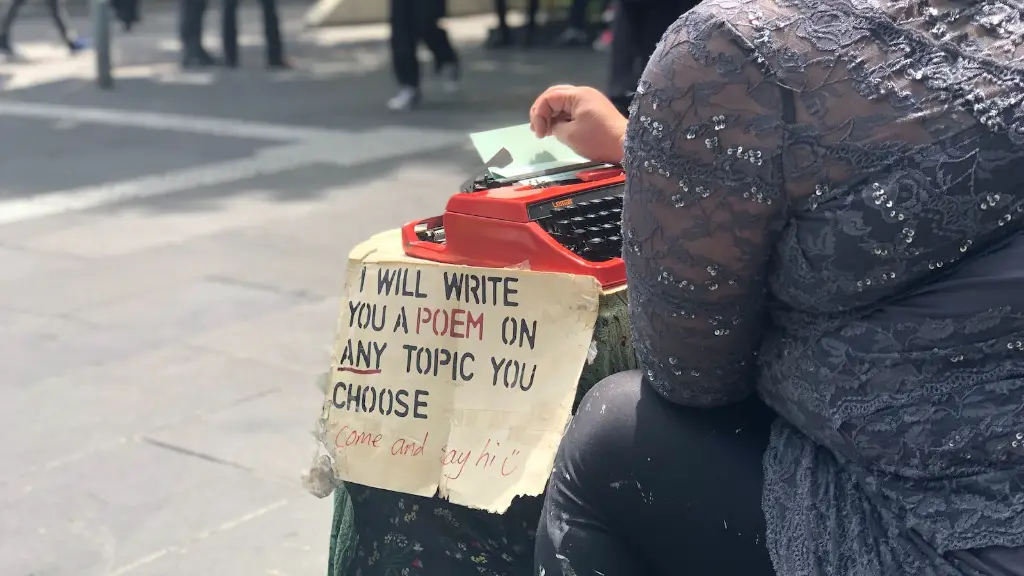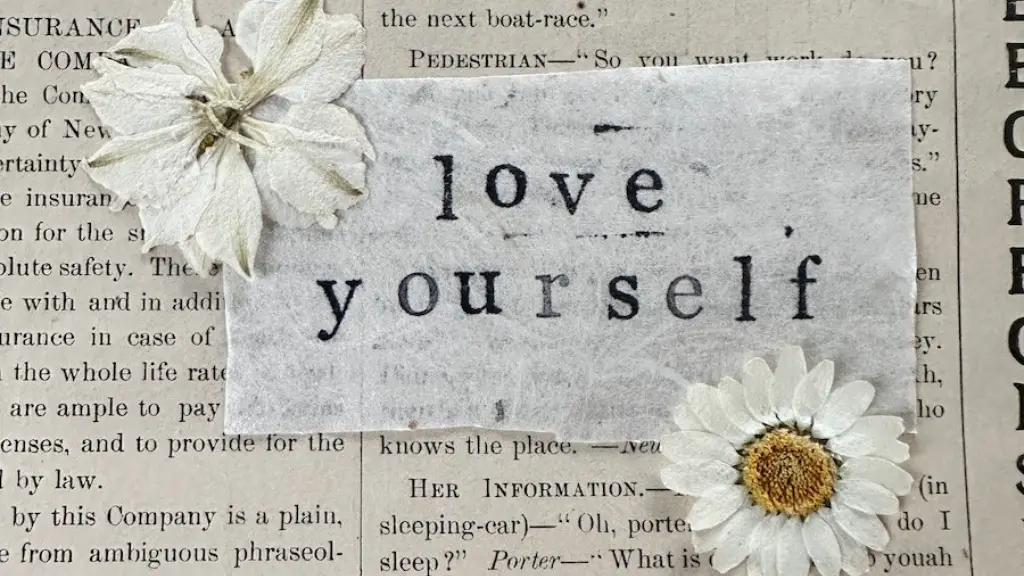Spoken word poetry is a powerful medium of expression, which has become increasingly popular in recent years. Through its unique combination of words and emotion, spoken word can be utilized as a tool of self-expression and advocacy. Whether taking the form of political activism or simply a personal storytelling outlet, spoken word can be one of the most cathartic and evocative forms of art and expression.
The main benefit of spoken word poetry is its capacity to build connections between people. During the performance, the poet has the opportunity to connect with their audience in a more intimate way than through traditional writing forms, since poet and audience can feel the emotion of the message more keenly. This in turn creates strong human bonds and feelings of empathy. Additionally, spoken word performances also can open up new perspectives on particular issues, and remind listeners that powerful messages need not always be executed through traditional forms.
Spoken word poetry can also be used as a form of self-expression and coping. Listening to or performing word poetry can be therapeutic for the people who participate, as it allows them to explore their thoughts and feelings and share them in a safe space. Moreover, when people perform their own compositions, it can be empowering and facilitate self-actualization. It also helps allow people to see themselves as creators and not just critics, letting them explore their potential as they take in other’s expressions as well.
In addition, spoken word can also be used to educate. By combining great stories and powerful messages, spoken word performances can be used to convey social and political messages in an educational yet highly engaging manner. The rhetorical and performative power of spoken word lends itself particularly well to expressing information in ways which stay with the audience. Consequently, spoken word can be used to highlight important issues and provide a pathway for communities to engage with them.
The nature of spoken word also inherently encourages participation and encourages collaboration. All audiences can express themselves in a crowd and many spoken word performances have activities that allow people to participate. This is especially important considering that in other forms of art, such as theatre or literature, audiences usually remain passive spectators. Spoken word performances create opportunities for the audience to express their opinion, thus allowing them to join in the creative process and engage more deeply in the discussion on any particular topic.
Perspectives from experts
According to Dr. Sarah Tamburrino, a psychologist and spoken word performer, “Spoken word poetry can be incredibly powerful not just as a platform to share stories, but also as a tool for social change. By combining the power of language and the emotions of internal experiences, spoken word can provide an arena to express the ideas of individuals, communities, and social issues in ways which create meaningful dialogue and evoke powerful change.”
A main advantage of spoken word over other forms of art is its ability to make people and their experiences more accessible to wider audiences. For example, Mike Edwards, a spoken word artist and Ph.D. student at University of California, explains that “…[spoken word] allows us to connect on a deeply personal level in ways that aren’t often available through other art forms. We get to know people in a way that is real and intimate – allowing us to understand their stories, their struggles and their joys.”
Dr. Giselle Corbie-Smith, professor of medicine and social medicine at the University of North Carolina at Chapel Hill School of Medicine, states that “spoken word poetry provides an “intellectual, experiential and analytical bridge” between advocacy and social justice. By engaging audiences with an art form that has traditionally been used to express important issues in a dynamic and impactful way, spoken word can be an incredibly valuable tool for disseminating messages of public health and creating positive social change.”
Data Relevant to Spoken Word Poetry
Recent studies suggest that spoken word poetry has a positive effect on confidence, self-expression and social bonds. According to a survey conducted by the National Alliance on Mental Illness (NAMI), individuals struggling with mental health issues reported feeling more connected to their peers and their environment after participating in spoken word programs. Additionally, they expressed an improvement in their quality of life and an overall increase in self-confidence and feeling of empowerment.
Other studies have also demonstrated that spoken word activities can be helpful in connecting people of different backgrounds and coping with experiences of marginalization. For example, a study in the United Kingdom found that participants of a spoken word poetry workshop with varying backgrounds had increased levels of social cohesion post-workshop, showing a clear capacity for spoken word to bridge the cultural gap between people.
Analysis of Current Trends
In the last decade, there has been a dramatic increase in spoken word poetry performances and events. With the advent of social media and digital platforms, the art of spoken word has gained increased recognition and visibility as a platform for expression. This has led to more opportunities for artists to find an audience for their work and to learn from and be inspired by other performers.
At the same time, various organizations and institutions have also been using spoken word poetry as a form of educational outreach. For example, the National Prison Radio Service offers a platform for inmates to share the stories of their experience. By making it easier for professionals, artists, and students to learn how to use spoken word as a form of communication, more projects are being created to encourage dialogue and foster deeper understanding.
Many popular spoken word performances have become increasingly politicized. In recent years, social and political activism through spoken word has gained traction, as poets seek to use their power to give a face and a voice to marginalized communities and to protest social injustice. Spoken word poets seek not only to entertain but also to be the advocate of people oftentimes unheard.
Personal Insights and Reflections
Having been an avid lover of spoken word since I was a teenager, I have to say that this art form has truly been a source of comfort and inspiration for me throughout my life. To me, spoken word allows for an outlet for creativity and for the release of emotions that may not otherwise be expressed. It has also been a source of solace during times of personal crisis, as I have found that being able to physically perform my words has given me a much-needed boost of self-confidence.
Being able to witness others’ performances and stories has been nothing short of moving and thought-provoking. Personally, I believe that spoken word provides a unique platform for diverse perspectives and unheard issues to be shared and heard both on an individual level, as well as collectively. One of my favorite writers and spoken word artist is Saul Williams, who has a powerful and intense way of conveying his messages while still making room for personal interpretations.
Socio-Cultural Context
When discussing spoken word, it is important to consider its historical context. Spoken word poetry is a practice rooted in African-American culture, which was used to share accounts of slavery, oppression, and the civil rights movement amongst others. Since then, spoken word has become more mainstream, yet it still retains its connections to African-American culture and its importance in bridging the gap between cultures.
In more recent years, we have also seen a surge in spoken word performances in Latino communities, particularly in areas struggling with immigration policies and discrimination. Spoken word artists have been utilizing their craft to tell their stories and to bring awareness to wider issues. Consequently, spoken word performances have served as a platform, in which marginalized and traditionally oppressed groups can share their experiences and create solidarity.
Contemporary Influencers
The last few decades have seen the emergence of some of the most influential spoken word artists. Pioneers such as David Bowie, Saul Williams, and Gil Scott-Heron have all contributed to bringing spoken word poetry to a greater audience, as well as to challenge current social and political systems.
Today, many spoken word poets have become prominent figures in the industry, creating a much-needed dialogue about social and political issues. Famous artists such as Lemon Andersen, Toni Blackman, and Imani Cezanne have used spoken word to create art that conveys powerful stories, making connections between various communities. By creating awareness and inspiring change, they have become important figures in advocating for their beliefs and creating meaningful dialogue.
Pros and Cons
Spoken word can be incredibly powerful and inspiring, however, it is important to consider both its benefits and its potential drawbacks. On the one hand, spoken word can be a powerful tool for conversation and activism and it can also be an invaluable outlet for expression. On the other hand, if done incorrectly, it can be hurtful and create misunderstandings. Spoken word performances require a great deal of sensitivity to ensure that political and social messages are not misinterpreted or misconstrued.
Moreover, spoken word can be quite demanding to perform, as it requires a lot of energy and emotion. Not everyone is comfortable with being in the spotlight and having their work judged in public, so it is important to consider the implications for mental health when recommending spoken word as an outlet.
Conclusion
Spoken word poetry provides an invaluable tool, which can be utilized as a platform for self-expression and creativity. Moreover, its potential to foster meaningful connections and inspire social change cannot be underestimated. By combining great stories with powerful messages, spoken word performances make it easier to disseminate information, raise awareness and create meaningful dialogue. With the increased popularity in recent years, spoken word has become one of the most accessible and impactful forms of art and expression.





